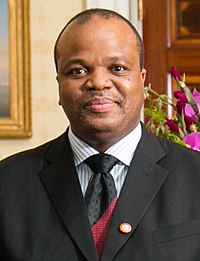Ngwenyama
| Ngwenyama of Eswatini | |
|---|---|
 | |
| Incumbent | |
 | |
| Mswati III since 25 April 1986 | |
| Details | |
| Style | His Majesty |
| Heir apparent | None |
| First monarch | Ngwane III |
| Formation | 1750s |
| Residence | Lozitha Palace, Lobamba |
 |
|---|
|
Ngwenyama (also Ingwenyama) is the title of the male ruler (King) of Eswatini. The Ngwenyama is the counterpart of the Ndlovukati.[1] The Ndlovukati at certain times may serve as a Regent.[2] The Ndlovukati is usually the Ngwenyama's mother.[3]
Ingwenyama means "Lion" in Swati but in an honorific sense, as opposed to libhubesi, the usual way of referring to actual lions. The title is sometimes written Ingwenyama, iNgwenyama, or ingwenyama, with the prefix i- (plural ti-, tiNgwenyama), meaning "the king".
The current king is Mswati III, who is reigning since 1986. The annual budget allocated to the King and the royal household amounts to $61 million.[4][5]
Powers[]
Economic[]
In Eswatini the Ngwenyama owns all minerals in Eswatini except for minerals owned by private corporations. The other aspects of mining are also controlled by the Ngwenyama.[6][7]
Administrative[]
The Ngwenyama can appoint 20 senators in the Senate of Eswatini and 10 members of the House of Assembly of Eswatini.[8][9]The Ngwenyama is also the head of the judicial system. The Chairman of the Swazi National Council is also the Ngwenyama.[10] Local officials that are responsible for the governance of Eswatini are either appointed by the Ngwenyama, or their superiors are appointed by the Ngwenyama.[11]
Cultural[]
Other powers the Ngwenyama has include, allocating land, starting national gatherings, disburse wealth, organize social events, and take part in rituals.[1] The Ngwenyama has royal praise singers called griots. Royal praise singers would appear at public events and sing about the virtues of the Ngwenyama.[12] Any offence against the Ngwenyama or Ndlovukati or their property was a heinous crime. It was illegal to wear the ruler's clothes, use their medicines, or be within a certain distance of them. Adultery with the Ndlovukati was treason, and the Ngwenyama could exile any citizen for any reason.
Religious importance[]
During the Incwala the Ngwenyama will split the sacred water to the east and west to signal the end of the last year. On the second day of the Incwala youths will gather special branches and place them in a special sanctuary. Then the Ngwenyama will sing with his subjects in the sanctuary, thus reaffirming their loyalty. Later the Ngwenyama would light a fire. The purpose of the festival was to secure the prosperity of the Kingdom of Eswatini.[13] The Ngwenyama can also cause rain.[14]
History[]
Sobhuza II played an important role in the modernization of Eswatini, not out of goodwill but to prevent revolution. The Royalist Imbokovdo party of Swaziland consistently wins the vast majority of seats, thus gaining total control over the government. This means that the Ngwenyama does not have to worry about opposition in the government.[12] Ngwenyama Mswati III compromised the traditional tinkundla system, replacing parts of the system with the modern Eswatini institutions.[15]
Succession[]
The Ngwenyama will be succeeded by one of his male sons. The son which will become Ngwenyama will be chosen based on the virtue of his mother.[16] The Ngwenyama has ingatiyebukoshi, which is the blood of kingship. If cattle is given to the Ngwenyama by the tribe his wife is from, the mother is "the mother of the people of the country." Her son, the heir to the throne, will be known as the "child of the people."[1]
See also[]
References[]
- ^ a b c Kuper, Hilda (1980 [1947]). An African Aristocracy. Rank Among the Swazi [facsimile reprint]. Africana Publishing Company for the International African Institute.
- ^ Mwalimu, Charles (2009). Seeking Viable Grassroots Representation Mechanisms in African Constitutions: Integration of Indigenous and Modern Systems of Government in Sub-Saharan Africa. Peter Lang. ISBN 978-1-4331-0782-5.
- ^ Andeweg, Rudy B.; Elgie, Robert; Helms, Ludger; Kaarbo, Juliet; Müller-Rommel, Ferdinand (2020-07-30). The Oxford Handbook of Political Executives. Oxford University Press. ISBN 978-0-19-253691-4.
- ^ "amaBhungane - Cash splash for Swazi king's wings". August 12, 2018. Archived from the original on August 12, 2018.
- ^ France-Presse, Agence (14 May 2014). "King of impoverished Swaziland increases household budget to $61m" – via www.theguardian.com.
- ^ Information Circular. 1925.
- ^ Ely, Northcutt (1970). Summary of Mining and Petroleum Laws of the World: Africa. U.S. Bureau of Mines.
- ^ "Swaziland: Constitution and Politics". The Commonwealth.
- ^ Publications, Europa (2003). Africa South of the Sahara 2004. Psychology Press. ISBN 978-1-85743-183-4.
- ^ A Comparative Study of National Integrity Systems in 5 Southern African Countries. Transparency International Zimbabwe. 2007. ISBN 978-0-7974-3508-7.
- ^ Kuper, Hilda (2018-08-16). An African Aristocracy: Rank Among the Swazi. Routledge. ISBN 978-0-429-99796-9.
- ^ a b Dlamini, Hlengiwe Portia (2019-09-25). A Constitutional History of the Kingdom of Eswatini (Swaziland), 1960–1982. Springer Nature. ISBN 978-3-030-24777-5.
- ^ Potholm, Christian P. (2021-01-08). Swaziland: The Dynamics of Political Modernization. Univ of California Press. ISBN 978-0-520-31731-4.
- ^ Marwick, Brian Allan (1966). The Swazi. CUP Archive.
- ^ Rwelamila, Pantaleo D.; Abdul-Aziz, Abdul-Rashid (2020-12-22). Improving the Performance of Construction Industries for Developing Countries: Programmes, Initiatives, Achievements and Challenges. Routledge. ISBN 978-1-000-28865-0.
- ^ Kuper, Hilda (2018-08-16). An African Aristocracy: Rank Among the Swazi. Routledge. ISBN 978-0-429-99796-9.
- Swazi monarchy
- History of Eswatini
- Politics of Eswatini
- Swazi words and phrases
- Monarchies of South Africa
- Titles of national or ethnic leadership